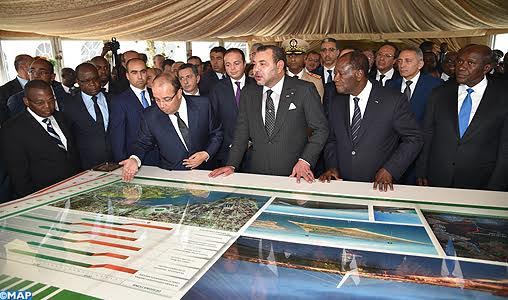Updated
Morocco Strengthens Ties with Africa through Sustainable Projects – Jean R. AbiNader
Multiple Agreements Signed during King Mohammed VI’s Visit to Four Countries

King Mohammed VI and Ivorian president Alassane Ouattara in Abidjan presenting the Cocody Bay development and preservation project. Photo: MAP
Jean R. AbiNader, MATIC
June 10, 2015
Morocco’s King Mohammed VI continued his economic diplomacy in Africa these past weeks visiting Côte d’Ivoire, Senegal, Guinea-Bissau, and Gabon. The most remarkable feature of these visits is the down-to-earth bilateral projects agreed to, which wed Moroccan expertise and resources with specific human and economic development goals in each country.
Morocco is not only the second-largest African investor in the continent, but it also provides scholarship support for more than 10,000 students from sub-Saharan Africa, contributes to bilateral and multilateral peace-keeping and security efforts, and is deeply involved in regional and continent-wide programs to promote entrepreneurism, innovation, and economic growth.
At his first stop, in Côte d’Ivoire, the King and President Alassane Ouattara chaired the signing of financial cooperation, infrastructure development, and communications and tourism agreements. The signings include: Attijariwafa Bank’s acquisition of the State’s shares of the Société Ivoirienne de Banque (SIB), thus completing its privatization; construction of a fishing facility in the town of Grand-Lahou; an MoU between Casablanca Finance City (CFC) and the Centre for Investment Promotion in Côte d’Ivoire linking their business promotion activities; and two MoUs signed by OCP, Morocco’s giant phosphates company, to work to support agricultural programs with the Ivorian National Agency for Support to Rural Development (ANADER) and the Coffee-Cocoa Board.
Senegal Broadens Bilateral Cooperation and Collaboration
Based on extensive preparatory work by bilateral committees set up during previous visits and exchanges, King Mohammed VI and President Macky Sall of Senegal presided over the signing of 13 cooperative agreements that continue one of Africa’s most dynamic and vibrant relationships.
According to a story in the North Africa Post, “These agreements seek to foster economic & industrial partnership and boost bilateral cooperation in the fields of sustained development, customs, fisheries, administrative management, logistics, handicraft, milk production, animal health, vocational training, drinking water, and rural electrification. They also aim to take bilateral relations to a higher level in the fields of finance, banking, investments, solar energy, and education (scholarship for students and executives).”
In addition, “The two countries have also set up a joint body tasked with the goal of bolstering economic partnership relations, encouraging contacts between the two countries’ private sectors, and following up the implementation of private-private and public-private accords.”
The latter initiative reflects the King’s belief that more accelerated and effective growth requires public-private sector partnerships (PPPs) to draw on the expertise and experience from both. The new bilateral body, called “The Morocco-Senegalese Economic Impetus Group,” co-chaired by the countries’ foreign ministers and heads of the employers’ associations, will meet twice a year.
While in Senegal, King Mohammed and President Sall attended the launch of two projects that are concrete examples of their bilateral cooperation: the connection of two Senegalese villages to the country’s national power grid, a project completed by a Moroccan company; and the launch of construction of a fishing pier in Dakar for artisanal fishermen, fully funded by Morocco. In addition, King Mohammed donated ten tons of medicines and medical equipment to the Fann University Hospital Center.
Momentum Continues in Guinea-Bissau and Gabon
President Jose Mario Vaz of Guinea-Bissau joining King Mohammed VI in presiding over the signing of 16 agreements as well as an agricultural partnership – once again demonstrating the King’s commitment to African solutions for Africa.
The agriculture partnership covers the exchange of information and best practices in ten areas, including rice cultivation, agricultural research and laboratory skills, livestock breeding, irrigation, use of fertilizers, and the promotion of PPPs for agricultural development. As an initial grant, the King donated veterinary and other livestock products to the partnership.
The 16 cooperative agreements spanned government-to-government ties as well as cooperation with civil society and the private sector in the areas of security and local governance, investment protection, marine fisheries and aquaculture, infrastructure technical assistance, mining, renewable energy development, vocational training exchanges, and others, according to an online report.
According to reports from the Moroccan Press Agency, King Mohammed VI and Gabonese President Ali Bongo Ondimba highlighted the work of Gabon’s Human Investment Strategy, modeled on Morocco’s National Initiative for Human Development, as a significant force for improving the lives of impoverished Gabonese citizens.
In addition, four partnership agreements were signed that illustrate the scope of the cooperation between the countries. The first focused on children with autism and Down syndrome; the second on setting up hemodialysis medical units; the third will support handicrafts and social development; and the fourth is a draft agreement covering cooperation in vocational training between relevant organizations in Morocco and in Gabon.
While others may pose questions and develop conceptual models of African development and bilateral assistance, the King of Morocco has been working for more than a decade on actual projects and initiatives that support human and economic development in Africa. He recognizes that Africa has to shape its future primarily through South-South cooperation. And if these past weeks are any indication, he has found willing partners who share his vision for Africa’s future.
